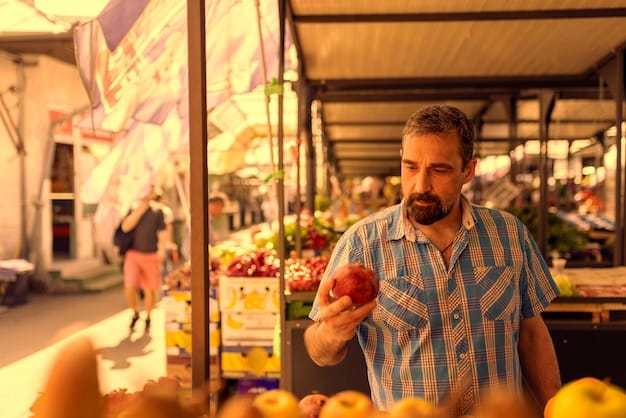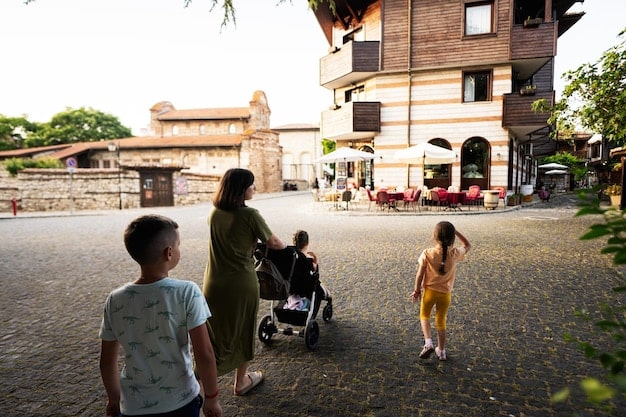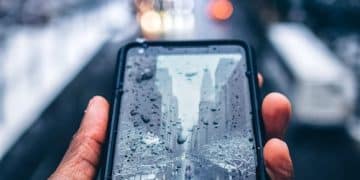Learn a New Language for Travel: Speak Basics in 3 Months

Learning a new language before traveling enhances your trip by facilitating interactions with locals, offering a deeper cultural immersion, and making you feel more confident and secure, and this guide shows you how to speak basic phrases in just three months.
Planning a trip abroad? Imagine being able to confidently order food, ask for directions, or simply chat with locals in their native tongue. Learn a new language before you travel and transform your experience from tourist to traveler by learning basic phrases in 3 months.
Why Learn Basic Phrases Before You Travel?
Before jetting off to your dream destination, consider the advantages of acquiring some linguistic skills. It’s not just about knowing a few polite phrases; it’s about opening doors to authentic experiences and deeper connections.
Learning a new language, even just the basics, can significantly enhance your travel adventures. It allows you to interact more meaningfully with locals, provides a deeper understanding of the culture, and boosts your confidence while navigating unfamiliar environments.
Enhanced Cultural Immersion
One of the most compelling reasons to learn a new language before traveling is the opportunity for enhanced cultural immersion. Knowing even basic phrases allows you to move beyond the superficial tourist experience.
Instead of relying solely on English or translation apps, you can engage in simple conversations with locals, ask questions, and show genuine interest in their lives and traditions. This creates a more authentic and memorable travel experience.
- Break down cultural barriers and build rapport with locals.
- Gain insights into local customs and traditions through direct communication.
- Experience a more authentic and less tourist-centric view of your destination.
By making an effort to learn a new language, you demonstrate respect for the local culture and open yourself up to unexpected and rewarding encounters. This can lead to invitations to local events, recommendations for hidden gems, and a deeper understanding of the local way of life.

Setting Realistic Language Learning Goals
Embarking on a language learning journey before a trip can seem daunting, but with realistic goals and a focused approach, you can achieve surprising results in a relatively short time. The key is to prioritize practical phrases and set achievable milestones.
Instead of attempting to become fluent, concentrate on learning essential phrases that will be most useful during your travels. Focus on greetings, basic requests, directions, and common phrases related to dining, accommodation, and transportation.
Focus on Essential Phrases
When you only have a few months to prepare, focus on high-frequency phrases that you’ll use repeatedly. These are the building blocks for basic communication and will help you navigate everyday situations.
Prioritize phrases like “Hello,” “Goodbye,” “Thank you,” “Please,” “Excuse me,” and “How much does this cost?” These simple courtesies can go a long way in making a positive impression and facilitating smooth interactions.
- Prioritize phrases related to your specific travel plans and activities.
- Use flashcards or language learning apps to memorize essential vocabulary.
- Practice pronunciation by listening to native speakers and repeating phrases.
Consistency is key to success. Set aside a specific time each day to dedicate to language learning. Even just 15-30 minutes of focused practice can make a significant difference over time.
Effective Language Learning Methods
Choosing the right learning methods can make all the difference in your language acquisition journey. From language learning apps to immersion techniques, there are many effective ways to learn basic phrases quickly.
What works for one person may not work for another, so experiment with different approaches and find the methods that best suit your learning style and preferences. Combining multiple methods can also accelerate your progress.
Language Learning Apps and Websites
Language learning apps like Duolingo, Babbel, and Memrise offer structured lessons, interactive exercises, and gamified learning experiences. These apps are convenient, affordable, and can be used anytime, anywhere.
Websites like iTalki connect you with native speakers for online lessons and language exchange. This provides valuable opportunities to practice your speaking skills and receive personalized feedback.
- Use apps for vocabulary building, grammar practice, and pronunciation.
- Supplement app learning with real-life conversations.
- Utilize free online resources like YouTube channels and language learning blogs.
Language learning apps are best used to build a foundation of vocabulary and grammar. From there, speaking to native speakers, even if over zoom, will help refine your pronunciation and make the learning more personalized.
Immersion Techniques for Rapid Learning

Immersion is a powerful technique for accelerating language learning. By surrounding yourself with the language you’re trying to learn, you force your brain to adapt and absorb new information more quickly.
While you may not be able to physically immerse yourself in a foreign country before your trip, there are many ways to create an immersive environment at home. This can involve changing the language settings on your phone, watching foreign films, listening to foreign music, and seeking out opportunities to interact with native speakers.
Create an Immersive Environment at Home
One of the most effective ways to create an immersive environment is to label objects in your home with their corresponding names in the target language. This helps you associate words with tangible objects and reinforces your vocabulary.
You can also create flashcards with images and words, and review them regularly. Another helpful technique is to change the language settings on your phone, computer, and social media accounts. This will expose you to the language in a familiar context and help you learn new vocabulary organically.
- Watch movies and TV shows in the target language with subtitles.
- Listen to music and podcasts in the target language.
- Read books and articles in the target language.
The beauty of an immersive environment is that it seamlessly integrates language learning into your daily life, making it less of a chore and more of an engaging experience.
Practice Speaking Regularly
Speaking is a crucial aspect of language learning, and it’s essential to practice regularly to build confidence and fluency. Speaking with native speakers, even if it’s just for a few minutes each day, can significantly improve your communication skills.
There are many ways to practice speaking, including language exchange partners, online tutors, and local language meetups. Don’t be afraid to make mistakes; they’re a natural part of the learning process. The key is to keep practicing and to focus on communicating your message effectively.
Find a Language Exchange Partner
Language exchange partners are individuals who are native speakers of the language you’re trying to learn and who are also interested in learning your native language. You can find language exchange partners online through websites like HelloTalk and Tandem.
These platforms allow you to connect with people from all over the world and practice speaking in a relaxed and supportive environment. You can also arrange to meet in person if there are potential partners in your local area.
- Prepare conversation topics in advance to make the most of your practice sessions.
- Focus on clear communication rather than perfect grammar.
- Be patient and supportive with your language exchange partner.
Practicing with native speakers builds confidence and allows you to experience the language in a real-world setting. The mistakes are natural and the language is fluid and organic.
Utilize Travel-Specific Resources
Tailoring your language learning to your specific travel plans can make the process more efficient and relevant. Travel guidebooks, phrasebooks, and online resources offer valuable insights into the most common and useful phrases for your destination.
Focus on learning phrases related to transportation, accommodation, dining, shopping, and sightseeing. This will equip you with the language skills you need to navigate everyday situations and interact with locals comfortably.
Travel Phrasebooks and Apps
Travel phrasebooks and apps are a convenient way to access essential phrases on the go. They typically include vocabulary lists, pronunciation guides, and cultural tips to help you communicate effectively.
Some popular travel phrasebook apps include Google Translate, iTranslate, and TripLingo. These apps offer offline access, audio pronunciations, and real-time translation capabilities. Some phrasebooks even have visual aides to allow you to point rather than speak.
- Download a travel phrasebook app before your trip.
- Study common phrases related to your travel itinerary.
- Use the app to practice pronunciation and test your knowledge.
A travel phrasebook or app is like a pocket-sized language tutor, providing instant access to the phrases you need, right when you need them. It ensures that you won’t be stuck at a restaurant trying to mime ordering food.
| Key Point | Brief Description |
|---|---|
| 🌍 Cultural Immersion | Learn basic phrases to connect with locals and understand their culture better. |
| 🎯 Essential Phrases | Focus on greetings, requests, and directions for practical travel use. |
| 📱 Language Apps | Use apps like Duolingo or Babbel for structured learning and vocabulary building. |
| 🗣️ Practice Speaking | Find language exchange partners for regular conversation practice. |
[Frequently Asked Questions]
▼
While fluency takes time, you can learn basic phrases in 3 months with consistent effort and focused study using apps, phrasebooks, and regular practice with native speakers.
▼
Use flashcards, repeat phrases aloud, and try to incorporate the new vocabulary into your daily conversations to help with memorization and recall during travel.
▼
Good pronunciation enhances understanding. Listen to native speakers, mimic their sounds, and don’t hesitate to ask for clarification or corrections to pronunciation.
▼
Focus on basic grammar rules, especially sentence structure, but focus on using practical phrases over perfect grammar to communicate during your travel.
▼
Apps are great for building vocabulary and basic grammar, but practicing with teachers or native speakers provides feedback and simulates real scenarios for better communication.
Conclusion
Learning a new language before traveling, even just some key phrases, can significantly deepen your travel experience, connect you with locals and allow you a freedom to explore beyond being just a tourist. With dedication to language learning in 3 months with a prioritized set of essential phrases, you can transform your travel.





